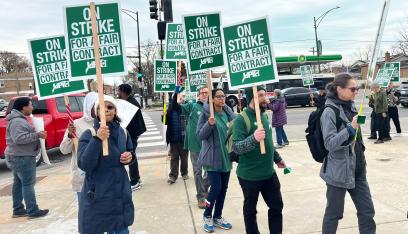Faculty and staff at Chicago State University and Eastern Illinois University went on strike April 3 and April 6, respectively. While the schools are 177 miles apart, they share some of the most compelling reasons to fight on the picket line: too much work for too little pay, and contract negotiations that have stretched on too long with too little progress.
At CSU, faculty salaries are the lowest in the state and workloads are excessive, but there is another reason staff have walked out: These unacceptable conditions exist at a majority Black-serving institution, signaling intolerable inequity.
“Our students come from Black and brown communities,” said Valerie Goss, University Professionals of Illinois chapter president at CSU, speaking at a recent rally. “I don’t understand why it is that our students have to endure faculty who are being paid less than faculty at any other institution. … [The administration’s] disinvestment in our faculty is a direct disinvestment in our students.”
Meanwhile, EIU faculty and staff are protesting a proposed wage “increase” that would actually lower pay, given inflation and other considerations—despite well-lined university coffers, according to the union. Among other concerns, the union wants wage adjustments to make up for lost pay and to ensure that no faculty member earns less than minimum wage.
Inequity and disrespect at CSU
With a 70 percent Black student population, Chicago State is the only predominantly Black public university in Illinois. The vast majority of students work full time, and about half receive Pell Grants, federal aid for low-income students. Many go on to become educators, said education professor and UPI member Patricia Steinhaus, and help diversify the teacher workforce.
Reports show that the faculty assigned to teach and mentor these promising and committed students earn $7,000 less than their peers at other public universities in the state. In addition to being racially and economically inequitable and unfair to current professors, union members are worried such a wage gap will prevent the school from retaining and recruiting new faculty.
More than 160 CSU faculty, lecturers, academic and technical support staff are represented by UPI, and their union began negotiating a new contract last June—more than 10 months ago. But members of the bargaining team say the sessions have not gone well. Goss called the disrespect the bargaining team has endured “grueling.”
For one thing, said Steinhaus, “the salary increase the university has put forward is a sign of disrespect. When it becomes evident that we are the lowest-paid state faculty and the president is among the highest-paid university presidents, that disrespect becomes factual.” Unionists note that CSU President Zaldwaynaka (“Z”) Scott is paid $395,000 a year; there were also rally signs objecting to money prioritizing the football program: “Faculty Over Football” and “Pay Us Like You Respect Us.”
“They’re sending a message that says our students don’t deserve the best,” said UPI President John Miller.
Negotiations continued through the strike, with sessions on April 4 and 5. At press time April 6, there had been no agreement.
A year’s worth of bargaining and no agreement
Faculty and staff at Eastern Illinois University are also insulted by low pay scales and were especially frustrated after an eight-hour bargaining session earlier this week resulted in administrators offering an inadequate pay proposal for the faculty who make this institution run. There was also no agreement on workload issues that have plagued the campus workforce.
Members of the EIU chapter of UPI have been working without a contract since last summer, and despite bargaining for more than a year, EIU UPI President Jennifer Stringfellow told NPR Illinois that the parties are “very far apart on key financial issues.”
EIU UPI represents about 450 tenured, tenure-track and nontenure-track faculty, academic advisers and academic support professionals who serve about 7,400 students.
Miller pledged UPI’s solidarity with EIU, CSU and also Governors State University, 30 miles south of Chicago, where the UPI chapter approved a strike authorization in early April. All three unions are fighting for fair pay and workloads so that Illinois students can benefit from a strong, well-supported faculty.
“We will stand strong on every campus so that students at Illinois public universities get the education they deserve,” said Miller. “We must hold these institutions accountable to the fact that investing in our faculty and staff is a direct investment in students, and it will only strengthen EIU’s future as a high-quality institution of higher education and an economic engine in this rural community.”
EIU’s next bargaining session is scheduled for April 7. Governors State faculty and staff expect to begin their strike the week of April 10.
You can stand in solidarity with CSU, EIU and GSU faculty and staff by signing their petition here.
[Virginia Myers]


